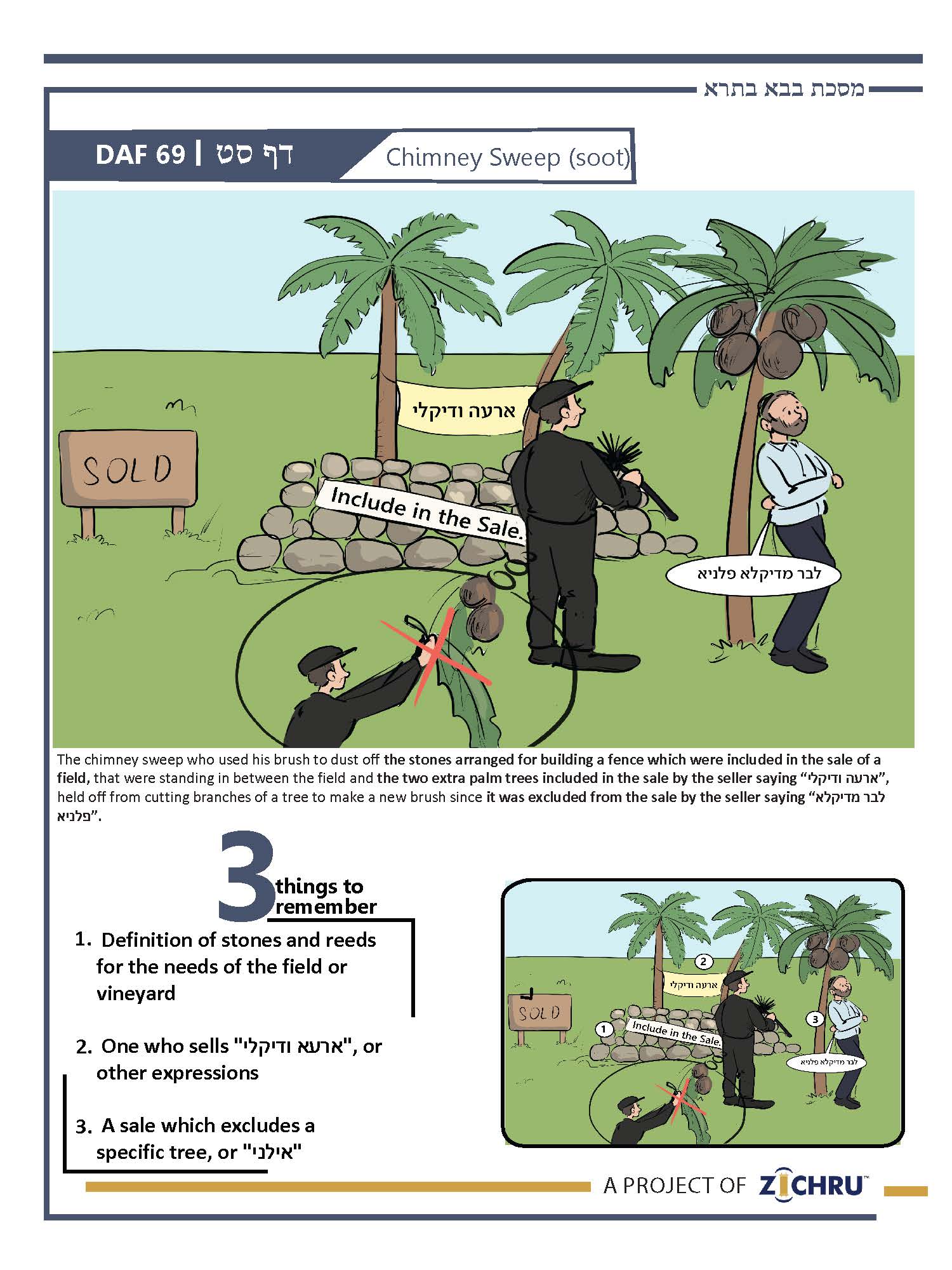Bava Basra - Daf 69
- Audio Timestamps
0:00 - The 3 Sugyos
3:03 - Review of 3 Sugyos
5:59- Siman
8:40 - 4 Blatt Back Chazarah
15:43 - Pop Quiz (Last 7 blatt)
For access to all Zichru resources including PDFs, and illustrations CLICK HERE
- Definition of stones and reeds for the needs of the field or vineyard
The Mishnah taught that אבנים שהן לצרכה – stones for the needs [of the field] are sold with the field. It Bavel this was explained as: אבני דאכפא – stones for weighing down harvested grain to keep it in place. Ulla explained it as: אבנים הסדורות לגדר – stones arranged for building a fence around the field. These opinions are further defined according to the machlokes Tannaim (on Daf 78b) if accessories are sold along with a vineyard. Rebbe Meir, who holds they are (and includes more in a sale), holds that stones which were prepared for weighing down grain are sold, even if they were not yet placed in the field. The Rabbonon only include stones which were placed. In Ulla’s case of stones for a fence, Rebbe Meir would include any stones which were prepared, even if they were not arranged; the Rabbonon would only include arranged stones. The Gemara then defines קנים – reeds of a vineyard “for its needs” as smoothed reeds for holding up the vines. According to Rebbe Meir, they are sold once they were planed (even before being stood in place), and the Rabbonon only include reeds after they were stood in place.
- One who sells "ארעא ודיקלי", or other expressions
One who sells a field automatically includes its trees in the sale (except mature carob and sycamore trees). If he says, “I am selling you ארעא ודיקלי – land and palms,” this means he sold two palm trees in addition to the land. Therefore, אי אית ליה דיקלי – if he has palms outside those this land being sold, יהיב ליה תרי דיקלי – he gives [the buyer] two of those palms. If he has none, זבין ליה תרי דיקלי – he buys two palms for him to maintain his honesty (although the sale was not binding). If he has palms on which others have a שיעבוד, he must “redeem” them by paying the debt. If he said he is selling ארעא בדיקלי – “land with palms,” then if the sold land has no palms, it is a מקח טעות – mistaken sale, and the money is refunded. If he said ארעא בי דיקלי – “a land which is a place for palms,” then the sale is valid even if the land has no palms, because he only meant דחזיא לדיקלי – that [the land] was capable of growing palms.
- A sale which excludes a specific tree, or "אילני"
If the seller said, “I am selling you the field לבר מדיקלא פלניא – except for [that particular] palm,” then if the specified tree is a דיקלא טבא – good palm (which produces a normal amount of fruit), then he retained only that palm, but sold the rest. If it is a דיקלא בישא – bad palm which produces less than a kav of fruit, then he certainly also retained those palms which do produce fruit. If he is selling the land "לבר מאילני" – without its trees, then if the land has ordinary trees, those trees are excluded from the sale. Although palms and vines are not usually called “trees,” if the field contains only palms (and no ordinary trees), the palms are excluded from the sale, because he must have referred to these as “trees.” If there are only vines, they are excluded. If there are trees and vines, or trees and palms, only the trees are excluded. If it contained only palms and vines, the vines are excluded. Rav says that any tree tall enough that a rope is used to ascend it to pick its fruit is retained by this exclusion, but the דייני גולה said that any tree which is not bent back by an ox’s plough is retained. The Gemara explains that the first refers to palms, while the second refers to ordinary trees.
Siman – Soot (Chimney Sweep)
The chimney sweep who used his brush to dust off the stones arranged for building a fence which were included in the sale of a field, that were standing in between the field and the two extra palm trees included in the sale by the seller saying “ארעה ודיקלי”, held off from cutting branches of a tree to make a new brush since it was excluded from the sale by the seller saying “לבר מדיקלא פלניא”.


